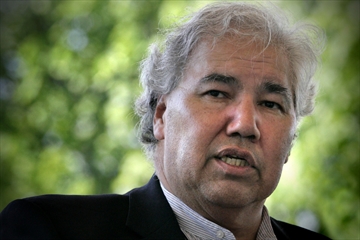History of Aboriginal peoples must be required for all Canadians and newcomers says First Nation leader

Canadians must know history of aboriginal peoples, says judge
Liz Monteiro, November 29, 2013
KITCHENER - Canadians and newcomers to this country must learn about the tragic history of aboriginal peoples in Canada in order to respect and understand each other.
"It took a long time to create the problem; it will take a long time to fix it," said Justice Murray Sinclair, head of the Truth and Reconciliation Commission of Canada.
Sinclair was in Kitchener Thursday to speak to about 300 people attending a three-day conference of the Canadian Council for Refugees. Other issues discussed by participants included migrant workers, human trafficking and the crisis of displaced people from Syria.
Manitoba's first aboriginal judge, Sinclair was appointed as chair of the commission in 2009, a year after the Stephen Harper government apologized to those forced to attend residential schools.
The commission's mandate is to learn about the truth of what happened in residential schools and to assist aboriginals and Canadians in the process of healing, with the goal of renewing relationships based on respect and understanding.
When the commission was established, 80,000 survivors of residential schools were still alive and almost half of them have applied for compensation, Sinclair said.
In Canada, about 150,000 children attended 140 government-funded, church-run schools. Catholics ran nearly three-quarters of the schools, while other denominations included Anglican, Presbyterian, United and some Baptist and Mennonite groups, Sinclair said.
The federal government of the 19th century was racist, said Sinclair.
"We were seen as uncivilized, and socially, culturally and intellectually inferior," he said. "We needed to be civilized through education and Christianization."
In the schools, the children, who ranged in age from seven to 18, were told they were "savages, pagans and heathens who were inferior and dirty," Sinclair said.
Sinclair describes the residential schools as "centres of indoctrination."
"Don't kid yourself. There was very little education going on there," he said. Instead, children were forced to work and physically beaten if they didn't comply.
Children were also sexually abused and bullied by staff at the schools. A report in 1907 showed up to 40 per cent of children were dying at the schools because of poor health conditions.
Tuberculosis was the No. 1 killer, Sinclair said.
Sinclair said the treaties between natives and the federal government after Confederation stated that schools for native children would be built on reserves.
But less than 20 years later - in 1880 - aboriginal children were being pulled from their homes and placed in residential schools.
Parents who tried to visit their children faced imprisonment. Siblings were separated from each other and children were punished for speaking their native tongue. Children were assigned numbers and never called by their names.
"Indian leaders were unlikely to go to war against Canada if the government had their kids," he said.
Residential schools led to many losses, including culture, language, pride and identity. The untold impacts are now affecting the children of survivors, he said.
Half of all children in government care are aboriginal, Sinclair said.
"More (aboriginal) children are in the care of government agencies than had been living in residential schools," he said.
In Manitoba alone, 70 per cent of males in prison are aboriginal, while 90 per cent of females in prison are native.
"These communities lost their leaders, tribes lost their status and authority and families were lost through breakdown," he said.
Sinclair said children of survivors have seen violence in the home and a lack of love and intimacy, support and role models while growing up.
